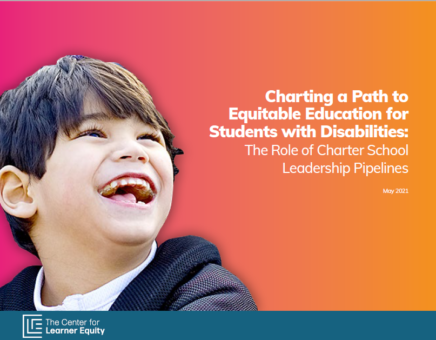Charter school leaders nationwide are frequently recruited and developed through leadership pipeline programs designed to prepare aspiring leaders to start and operate charter schools. Leadership pipeline programs aim to develop leaders capable of creating schools with diverse designs and education models, and the data show that they can play a positive role. Given this impact, we see leadership pipeline programs as critical to ensuring that students with disabilities can access and thrive in charter schools.
 Across the United States, students with disabilities are being left behind academically. With their flexibility and and capacity for innovation, charter schools offer an opportunity to improve these outcomes. However, data from the Civil Rights Data Collection (CRDC), parent focus groups and surveys, and research on schools’ responses to inquiries from parents of students with disabilities all tell us that not all students feel welcome in charter schools or are succeeding in them. To improve access and outcomes for students with disabilities, the charter sector must both build foundational leadership capacity and make a firm commitment to high expectations for students with disabilities.
Across the United States, students with disabilities are being left behind academically. With their flexibility and and capacity for innovation, charter schools offer an opportunity to improve these outcomes. However, data from the Civil Rights Data Collection (CRDC), parent focus groups and surveys, and research on schools’ responses to inquiries from parents of students with disabilities all tell us that not all students feel welcome in charter schools or are succeeding in them. To improve access and outcomes for students with disabilities, the charter sector must both build foundational leadership capacity and make a firm commitment to high expectations for students with disabilities.
This brief comes out of our examination of leadership pipeline programs and collaboration with these programs to infuse inclusive mindsets and strong programs for students with disabilities into their training models. In particular, it focuses on our findings regarding how future charter school leaders are trained in pipeline programs, specifically on educating students with disabilities. We explore how the pipelines operate, who their target audiences are, and how and to what extent they include issues related to educating students with disabilities. We also look at what opportunities may exist to enhance their training on these issues.
Comments are closed.